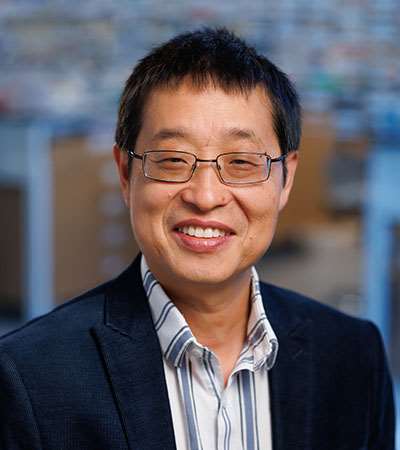
Xue-Zhong Yu, MBA, MS, MD
Professor, Microbiology & Immunology; Associate Director of Basic Sciences in the MCW Cancer Center
Locations
- TBRC 3870
Contact Information
General Interests
Research Areas of Interest
- Adoptive Transfer
- Graft vs Host Disease
- Graft vs Leukemia Effect
- Immunotherapy
- T-Lymphocytes
Research Experience
- Bone Marrow Transplantation
- Cell Differentiation
- Cell Proliferation
- Disease Models, Animal
- Hematopoietic Stem Cell Transplantation
- Lymphocyte Activation
- T-Lymphocytes, Regulatory
- Xenograft Model Antitumor Assays
Leadership Positions
- Associate Director in Basic Sciences, the Cancer Center
MCW Program / Core Facilities
- Cancer Center
- Center for Immunology
Research Interests
The research scope of Dr. Yu’s laboratory (Yu Lab) is in tumor immunology and cancer immunotherapy. The researchers in Yu’s Lab have been focusing on two lines of basic and translational studies:
- Allogeneic Hematopoietic Cell Transplantation (allo-HCT). Acting through donor lymphocyte-mediated mechanisms termed the graft-versus-leukemia (GVL) effect, allo-HCT is an effective therapy for hematological malignancies such as leukemia. However, graft-versus-host disease (GVHD) remains a prominent cause of transplant-related morbidity and mortality after allo-HCT. Despite advances in patient care and pharmacologic prophylactic strategies, the incidence of GVHD, especially cGVHD, has not been substantially reduced over the years. Furthermore, corticosteroids remain as the first line therapy for GVHD and frequently fail with life-threatening consequences. Yu Lab focuses on defining the cellular and molecular mechanisms that regulate the pathogenicity of allogeneic T and B cells in GVHD, and on developing new and effective therapies to prevent and treat GVHD.
- Adoptive T-cell Therapy (ACT). The adaptive immune system has the capacity to recognize and kill malignant cells. However, immune tolerant mechanisms that normally protect healthy tissues from autoimmune attack prevent the development of effective anti-tumor immunity. Tumors use numerous immunosuppressive mechanisms to evade otherwise effective T-cell responses. Despite promising results achieved by targeting one or more of the immune evasion mechanisms, there is clearly room for improvement because only a subset of cancer patients usually respond to current treatment. Aiming at understanding T-cell response against tumor and promoting anti-tumor activity, Yu Lab is interested in investigating T-cell activation, differentiation, persistence, migration, and metabolism in immunotherapy against cancer.
Publications
-
ER stress sensor PERK promotes T cell pathogenicity in GVHD by regulating ER-associated degradation.
(Cheng Q, Choi HJ, Wu Y, Yuan X, Pugel A, Tian L, Hendrix M, Fu D, Alimohammadi R, Liu C, Yu XZ.) J Clin Invest. 2025 Dec 01;135(23) PMID: 41026526 PMCID: PMC12646671 SCOPUS ID: 2-s2.0-105023549695 09/30/2025
-
(Oleinik NV, Atilgan FC, Kassir MF, Lee HG, Janneh AH, Wofford W, Walton C, Szulc ZM, Hill EG, Alekseyenko AV, Cimen H, Hartman JH, Voelkel-Johnson C, Lilly MB, Lemasters JJ, Frizzell N, Yu XZ, Mehrotra S, Ogretmen B.) Cancer Res. 2025 Sep 02;85(17):3313-3334 PMID: 40540357 PMCID: PMC12247146 SCOPUS ID: 2-s2.0-105014771177 06/20/2025
-
(Yu K, Tang Y, Wang C, Liu W, Hu M, Hu A, Kuang Y, Zacksenhaus E, Yu XZ, Xiao X, Ben-David Y.) Int J Mol Sci. 2024 Dec 14;25(24) PMID: 39769192 PMCID: PMC11676164 SCOPUS ID: 2-s2.0-85213233175 01/08/2025
-
(Fang K, Ohihoin AG, Liu T, Choppavarapu L, Nosirov B, Wang Q, Yu XZ, Kamaraju S, Leone G, Jin VX.) Genome Med. 2024 Nov 18;16(1):134 PMID: 39558215 PMCID: PMC11572372 SCOPUS ID: 2-s2.0-85209564467 11/19/2024
-
(Choi HJ, Wu Y, McDaniel Mims B, Pugel A, Tang CA, Tian L, Hu CA, Yu XZ.) J Immunol. 2024 Aug 01;213(3):384-393 PMID: 38864663 PMCID: PMC11415232 SCOPUS ID: 2-s2.0-85198941904 06/12/2024
-
Tipping the GVH/GVL balance by targeting HIF1α.
(Wu Y, Yu XZ.) Cell Rep Med. 2023 Nov 21;4(11):101295 PMID: 37992679 PMCID: PMC10694739 SCOPUS ID: 2-s2.0-85177835310 11/23/2023
-
Targeting protein tyrosine phosphatases for CDK6-induced immunotherapy resistance.
(Gao X, Wu Y, Chick JM, Abbott A, Jiang B, Wang DJ, Comte-Walters S, Johnson RH, Oberholtzer N, Nishimura MI, Gygi SP, Mehta A, Guttridge DC, Ball L, Mehrotra S, Sicinski P, Yu XZ, Wang H.) Cell Rep. 2023 Apr 25;42(4):112314 PMID: 37000627 PMCID: PMC10544673 SCOPUS ID: 2-s2.0-85151481968 04/01/2023
-
(Bastian D, Sui X, Choi HJ, Wu Y, Tian L, Yang K, Liu C, Liu Y, Yu XZ.) J Immunol. 2023 Feb 15;210(4):486-495 PMID: 36548465 PMCID: PMC9938950 SCOPUS ID: 2-s2.0-85147317750 12/23/2022
-
(Han L, Wu Y, Fang K, Sweeney S, Roesner UK, Parrish M, Patel K, Walter T, Piermattei J, Trimboli A, Lefler J, Timmers CD, Yu XZ, Jin VX, Zimmermann MT, Mathison AJ, Urrutia R, Ostrowski MC, Leone G.) Nat Commun. 2023 Jan 03;14(1):1 PMID: 36596776 PMCID: PMC9810714 SCOPUS ID: 2-s2.0-85145429848 01/04/2023
-
ER stress: an emerging regulator in GVHD development.
(Choi HJ, Yu XZ.) Front Immunol. 2023;14:1212215 PMID: 37744326 PMCID: PMC10511645 09/25/2023
-
ER stress: an emerging regulator in GVHD development
(Choi HJ, Yu XZ.) Frontiers in Immunology. 2023;14 SCOPUS ID: 2-s2.0-85171864193 01/01/2023
-
(Schutt SD, Wu Y, Kharel A, Bastian D, Choi HJ, Hanief Sofi M, Mealer C, McDaniel Mims B, Nguyen H, Liu C, Helke K, Cui W, Zhang X, Ben-David Y, Yu XZ.) J Clin Invest. 2022 Nov 01;132(21) PMID: 36074578 PMCID: PMC9621143 SCOPUS ID: 2-s2.0-85141004782 09/09/2022

